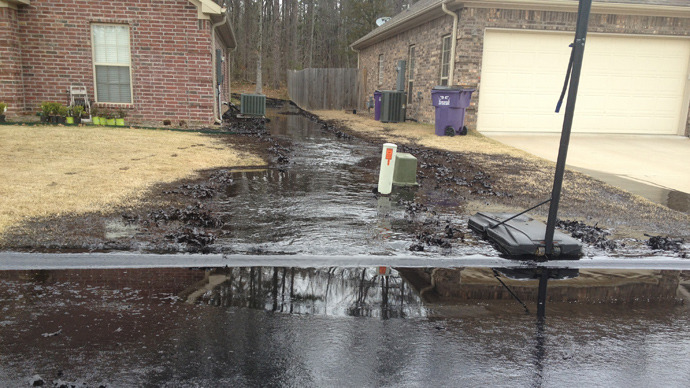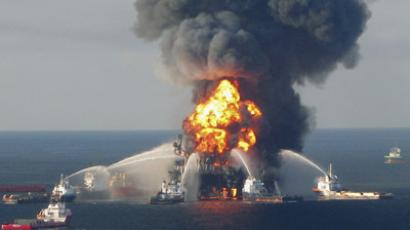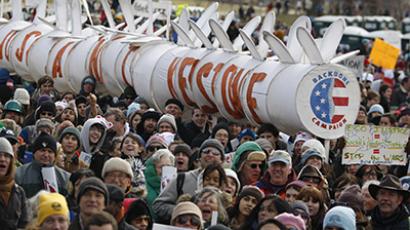Rivers of oil in Arkansas town: Many 'didn't even know' Exxon pipeline ran under their homes

Residents of Mayflower, Arkansas are shocked, frustrated and discouraged after an ExxonMobil oil pipeline - which many were unaware existed - burst, devastating the small town by flooding its streets with thousands of barrels of Canadian crude.
ExxonMobil is cleaning up the town after an oil pipeline spilled thousands of oil all over its streets. The company's Pegasus pipeline – which can carry more than 90,000 barrels of Canadian Heavy crude oil per day from Patoka, Illinois, to Nederland, Texas – was shut down after the leak was discovered on Friday in a suburban area near the Arkansas town of Mayflower.
“A lot of people weren't even aware that the pipeline ran through the area,” resident Chris Harrell told RT.
Twenty-two houses have reportedly been evacuated as locals wait
for the green light to return home. “The major concern for
many in our neighborhood is the long-term impact from the spill,
both environmentally and financially. For example, what’s this
going to do to our property values?” Harrell said.
Harrell spoke to RT about the effects of the pipeline accident, and how residents are coping with
the massive spill.
RT:We understand you live in a subdivision
affected by the oil spill. Can you explain the situation to
us?
Chris Harrell: The leak occurred around 3:00pm Friday
afternoon Central Standard Time. I was only allowed into the
neighborhood because my wife and children were still in our home.
We packed their bags and sent them to her parents’ house, and I
stayed in our home in the subdivision. The actual leak occurred
on the street directly behind my house and flowed down. Those
streets were the only ones that experienced forced evacuation.
The rest of the neighborhood was advised to evacuate. Friday
afternoon was quite chaotic – a lot of local state and federal
officials in and out of the neighborhood trying to assess the
situation and determine the best course of action.
RT:Twenty-two homes have been evacuated so
far. How are people in the area dealing with the spill?
CH: Most of the people in the 22 homes that were
evacuated are staying in local hotels. My neighbor directly
behind me was forced to leave Friday afternoon, and was only
allowed to come back to his home for 20 minutes to pack enough
belongings for the next week. My family and I are allowed to be
in our house a week. We are staying there now. However, there is
a police checkpoint at the entrance to our subdivision – we have
to show ID and be logged in and out to show who is in the
neighborhood.
This is a precaution to avoid any potential looting, and also to
keep track of any accidents that may occur during the cleanup.
The smell is quite horrendous outside and especially in our home.
There is a very strong smell of oil in our vehicles. It's quite
an inconvenience to get in and out of the neighborhood. There are
a lot of vehicles parked there, a lot of machinery, a lot of
equipment. The street behind us is completely lit up at night.
Crews are going 24 hours, it’s a lot of noise.

RT:Have there been any local protests
against ExxonMobil regarding the spill? How are Mayflower
residents reacting?
CH: There is some anger. There was some shock in
the community. A lot of people weren't even aware that the
pipeline ran through the area. There was a community meeting on
Saturday afternoon with some Exxon officials present, and there
was a lot of frustration shown at the meeting. Very few answers
were given, and the people in attendance were quite angry.
RT:How many cleanup crews are there now?
What are they doing, exactly?
CH: There are literally hundreds of cleanup crew
people in our area, both in the neighborhood and over towards the
lake, and in the ditches and drainages between the two. They
started by blocking off the ditches to slow the oil flow. To keep
it out of the lake, they put up booms in the lake to contain the
one small wetland area where the ditch drains into. They then
brought in trucks to vacuum up as much oil as they could, which
is still ongoing, and also started working on washing off the
street.
RT:Have you been given any indication when
the cleanup will be over and life can return to normal? Are the
crews communicating with residents in any way?
CH: No one has a definite time frame on how long the
crews will be in the area, but some folks are saying months.
There's been no official communication with me from any of the
crews. I have spoken to a few of the workers on a one-on-one
basis, just standing around in my yard.

RT:Has any effort been made by ExxonMobil
to apologize or provide compensation to residents?
CH: On Sunday afternoon I returned home from celebrating
Easter with some family, and there was a letter from Exxon on my
front door with ‘apologies for the inconvenience.’ I've been told
that there is an Exxon agent at City Hall who is providing
compensation for any receipt shown for out-of-pocket expenses
incurred by residents from the effects of the oil spill.
Those who have been evacuated are being provided the hotel
they're staying in. I have not received any indication of any
kind of compensation or settlement offers. The major concern for
many people in our neighborhood is a longer-term impact from the
spill, both environmentally and financially. For example, what's
this going to do to our property values?
RT:The spill comes amid growing opposition
to the Keystone XL project, which would see an oil pipeline run
across the Midwest. Environmentalists have raised concerns about
pollution risks from the project. How do you and other locals
feel about such projects, considering what has just happened to
your community?
CH: An oil pipeline is fine until it ruptures in
your backyard. I would personally rather have a new pipeline than
the one that just ruptured, that is supposedly from the 1940s. I
think you have to pay the piper. I don't know what the other
options are, as long as America remains so oil-dependent.
Follow RT's in-depth day-by-day timeline on the Arkansas oil spill














